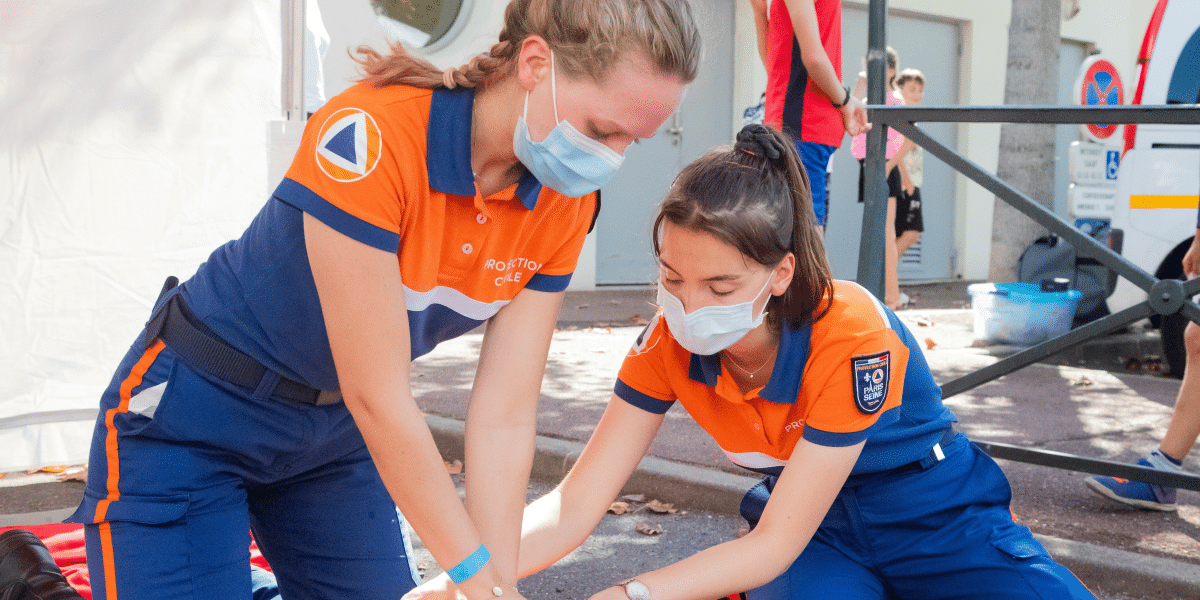Understanding the Basics of First Aid
First aid is the initial assistance given to someone who has been injured or is suddenly taken ill. The primary goals are to preserve life, prevent the condition from worsening, and promote recovery. Knowing how to administer first aid can make a significant difference in an emergency.
Cardiopulmonary Resuscitation (CPR)
CPR is a critical skill used to maintain circulation and breathing in a person who has suffered cardiac arrest.
- How to Perform CPR:
- Check for responsiveness and breathing.
- Call for emergency help if there is no response.
- Begin chest compressions: Place the heel of one hand in the center of the chest, place the other hand on top, and interlock fingers. Press down hard and fast, at least 2 inches deep, at a rate of 100-120 compressions per minute.
- After 30 compressions, give 2 rescue breaths if trained to do so.
- Continue CPR until emergency services arrive or the person shows signs of life.
Managing Bleeding
Controlling bleeding is essential to prevent shock and further injury.
- Steps to Control Bleeding:
- Apply direct pressure to the wound using a clean cloth or bandage.
- Elevate the injured area above the level of the heart if possible.
- Apply a pressure bandage to maintain pressure on the wound.
- If bleeding continues, use a tourniquet as a last resort, placing it above the injury site.
Treating Burns
Burns can vary in severity from minor to life-threatening.
- First-Degree Burns: Affect only the outer layer of skin.
- Cool the burn under cool running water for at least 10 minutes.
- Cover with a sterile, non-stick dressing.
- Avoid using ice, creams, or greasy substances.
- Second-Degree Burns: Affect deeper layers of skin.
- Follow the same steps as for first-degree burns.
- Do not pop blisters; seek medical attention if the burn is extensive.
- Third-Degree Burns: Affect all layers of skin and possibly underlying tissues.
- Seek immediate medical help.
- Do not remove burnt clothing.
- Cover the burn with a cool, moist, sterile bandage or cloth.
Addressing Fractures and Sprains
Properly treating fractures and sprains can prevent further injury and aid in recovery.
- Fractures:
- Immobilize the affected area using a splint or padding.
- Apply ice to reduce swelling.
- Seek medical attention immediately.
- Sprains:
- Rest the injured area.
- Apply ice packs to reduce swelling.
- Compress with an elastic bandage.
- Elevate the injured limb above the level of the heart.
Recognizing and Treating Shock
Shock is a life-threatening condition that occurs when the body is not getting enough blood flow.
- Symptoms of Shock:
- Pale, cold, clammy skin.
- Rapid, shallow breathing.
- Weak, rapid pulse.
- Dizziness or fainting.
- Nausea or vomiting.
- Treatment for Shock:
- Lay the person down and elevate their legs unless it causes pain or potential harm.
- Keep the person warm and comfortable.
- Do not give them anything to eat or drink.
- Seek emergency medical help immediately.
Handling Common Illnesses
Understanding how to address common illnesses can provide comfort and prevent complications.
- Fever:
- Monitor body temperature regularly.
- Keep the person hydrated with fluids.
- Use fever-reducing medications like acetaminophen or ibuprofen.
- Keep the person cool with a damp cloth or light clothing.
- Dehydration:
- Encourage drinking water and oral rehydration solutions.
- Monitor for signs of severe dehydration, such as confusion, dizziness, and dark urine.
- Seek medical help if symptoms worsen.
- Cold and Flu:
- Ensure plenty of rest.
- Keep the person hydrated.
- Use over-the-counter medications to relieve symptoms.
- Encourage good hygiene practices to prevent the spread of illness.
Basic Wound Care
Proper wound care is crucial to prevent infection and promote healing.
- Cleaning Wounds:
- Rinse the wound with clean water.
- Use mild soap around the wound if necessary.
- Pat the area dry with a clean cloth.
- Applying Dressings:
- Cover the wound with a sterile bandage or dressing.
- Change the dressing regularly and monitor for signs of infection.
Basic medical skills and knowledge are vital for addressing injuries and illnesses promptly and effectively. Whether you are in a remote area or waiting for emergency services, these skills can make a significant difference in outcomes. By learning and practicing these techniques, you can enhance your ability to respond to emergencies and provide essential care to those in need.








